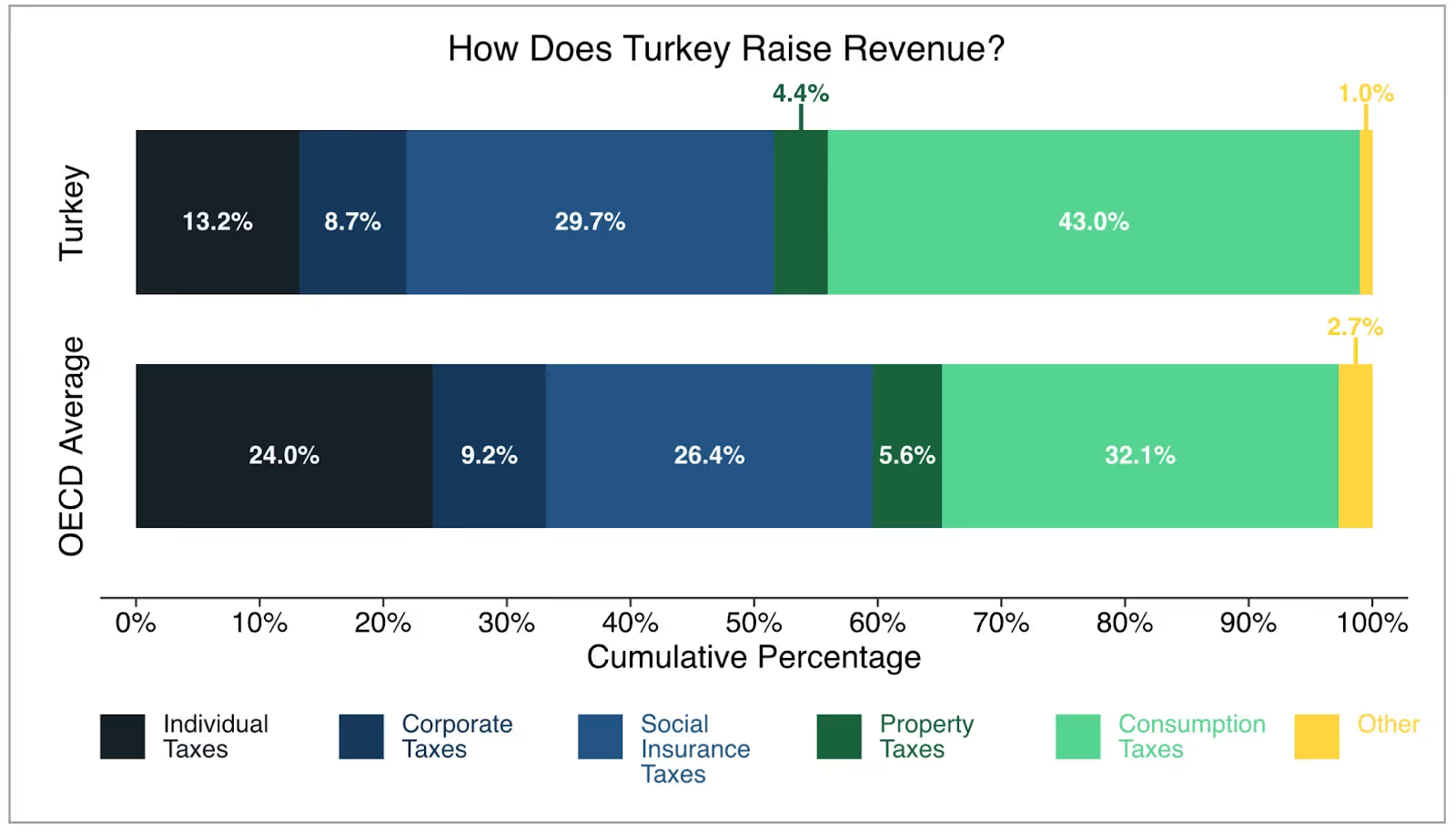Freelancers, who want to optimize their revenue and avoid penalties, first need to be aware of the tax rates, paperwork requirements, and deadlines.
One of the most tedious elements of working freelance is negotiating taxes, particularly in such a country as Turkey, where the tax laws are relatively complex.
In 2025, the Turkey tax rates for freelancing continue their upward pattern as more duties like VAT and social security payments are included.
Basics of Turkish Freelance Taxation
As you are a self-employed freelancer working in Turkey, you have to handle your own taxes.
This is not at all like conventional employment, when your company obviously takes taxes out of your paycheck.
Those who work for themselves have to calculate their taxable income, complete the required tax forms, and timely pay their taxes. Ignoring this might lead to fines, interest charges, or even legal problems; so it’s important to stay on top of your tax responsibilities.
The Turkey taxation designed for independent contractors largely consists of income tax, value-added tax (VAT), and social security payments. To make sure you are paying the right amount, try to stay up to date about the policies and rates.
Taxes for Freelancer in Turkey
Let’s look at tax rates in 2025 in the country.
Income tax is the primary tax for freelancers in Turkey. The country has a progressive income tax system, which means your income directly determines the tax rate.
This approach ensures that the wealthier individuals pay a higher percentage of their income in taxes than those who are less fortunate. Depending on your earnings, rates change from 15% to 40%. Still, freelancers should pay income tax rates that line up with past years.
Working as a freelancer, the first thing you have to do is carefully record all of your annual earnings. This includes money from Turkish as well as from any international client. Then deduct your business expenses from your total income. The result shows how much your income is taxable.
Deductible expenses may include office supplies, tools, travel expenses related to your work, even a small rental or mortgage if you use part of your house for business.
Let’s say your total annual income is 200,000 TRY. Using 50,000 TRY for business expenses would leave 150,000 TRY as your taxable income. Since the tax rate is determined by the amount of your income, the more your income increases, the higher the tax rates become.
Understanding the operations of these tax rates is vital because it allows you to predict your tax liability and manage your budget more efficiently.
Value-Added Tax (VAT) for Work
Apart from income tax, Turkish independent contractors pay VAT: a consumption tax charged on goods and services. Your yearly revenue and the kind of service/good you provide determine if VAT on your services is due.
Standard VAT rate of Turkey in 2025 is 18%; certain items and services have lower rates and exemption.
As a freelancer, you have to charge VAT on every invoice and provide the gathered VAT to the tax authorities using frequent VAT reports, generally monthly.
If you go over the limit, the VAT rate would be 20% for your service, often resulting in more costly services for consumers. But, you need to fulfill the legal requirements.
Let’s discuss applying VAT rates to your invoices. As a freelancer, assume you bill your customer 10,000 TRY for a project. This amount would need to be increased by 20% VAT, resulting in a 12,000 TRY invoice.
When you submit your VAT report, you must pay 2,000 TRY in VAT; this is tax paid to the government rather than personally. Always consult a tax practitioner or the Turkish tax authorities to ensure you are complying with the law.
Contributions Made to Social Security Payroll
Social security payments are another important payment for freelancers in Turkey. Among the many social benefits, these payments provide pension schemes, health insurance, and unemployment protection.
As a freelancer, you have to register with the Social Security Institution (SGK-Bağkur) and pay a monthly fee based on your declared income.
Percentage of the standard social security payment for Turkish independent contractors is around 33.5% of income. This proportion addresses your pension, health insurance, and other social security payments.
Unlike income tax, social security payments are determined according to the income you declared; there is no deduction based on your entire income.
Making these payments on time is very crucial. Failing to do so might result in fines and even compromise your eligibility for the next social benefits.
Ask a tax professional to assist you with negotiating the procedure if you are unclear about how to determine or pay these amounts.
Does Turkey Have High Taxation?
Yes, we see that there are high taxation rates in Turkey.
The OECD has shared info about the tax rates in different countries and how they stack up against the average rates in OECD nations. When we look at Turkey, it turns out that the tax rates here are pretty high compared to the average.
Consumer taxes (VAT), individual taxes (income taxes), and social insurance payments are already the taxes freelancers have to pay and Turkey raises revenue mostly from these three categories.
Tax Foundation Reports:

So it’s hard to say that Turkey is a tax haven country for freelancers. However, the country has double tax treaties with 185 countries, so if you are already paying taxes in some of them, you do not have to pay in Turkey again. Plus, the country tax rate is not so high when you compare it to the EU member countries like Germany, Italy, France, and Greece.
Try Ruul for Payments
Dealing with invoices and payments can be super boring and tedious for freelancers. Luckily, Ruul has some handy tools that simplify the whole process.
To enable you to concentrate on your business, Ruul provides a complete system for;
- simplifying invoicing,
- payment processing, and
- cash management.
Ruul promises you that your invoicing process will be flawless and your payments will be processed quickly, with options like freelance crypto payouts. This can be very helpful when you are trying to maintain organized records and manage multiple customers.
Frequently Asked Question
Do freelancers in Turkey have to pay VAT on their services?
Yes, freelancers in Turkey are required to pay Value-Added Tax (VAT) on their services, depending on their annual revenue and the type of services they provide. The standard VAT rate in 2025 is 18%, but some services may have different rates or exemptions. Freelancers must charge VAT on invoices and submit regular VAT reports to tax authorities, usually every month.
How much income tax do freelancers pay in Turkey in 2025?
Turkey has a progressive income tax system, meaning the tax rate depends on earnings. In 2025, freelancers can expect to pay income tax rates ranging from 15% to 40%.










